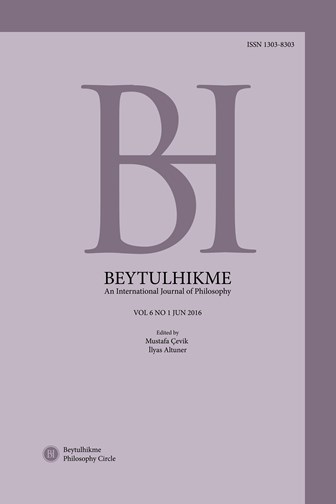Author :
Abstract
Nefretten farklı olan hınç (ressentiment) kavramı, Nietzsche’nin analizlerinde önemli bir konuma sahiptir. Bir duygusal durum olmanın ötesinde yaratıcı bir varoluş hali olan hınç, bedel ödeyerek de olsa içsel bir derinleşmeye, tinselleşmeye yol açar. Avrupa’ya bir ufuk olarak da olsa egemen olan kölece değerler (özgecilik, merhamet, dayanışma vb.) köklerinde hıncı taşıdıkları için sanıldıkları kadar saf değillerdir. Nietzsche böylesine saf ve tartışılmaz görünen hümanist değerlerin içindeki karanlık izlerin peşinden giderken soykütük adını verdiği yöntemi kullanır. Hınç sanıldığının aksine sadece negatif, tepkisel olmayıp yaratıcı da olabilmiştir. Nefretle başlamanın, ikincil olarak başlamanın yani tepkisel olmanın sonucu olarak hınç, Deleuze’nin deyişiyle etkin kuvveti bölerek, parçalayarak ortaya koyar gücünü; galip geldiğinde bile bir tepki olmaktan kurtulamaz. Hınç insanının, ev hayvanının, sıradan olanın, vasatın seçkin olana duyduğu hınç, suçu dışarıda bulamadığı için en sonunda kendine dönerek sahte bir rahatlama yaratır. Bu huzurun bedeli ise kendine işkence eden, vicdan sahibi insandır. Bu makalede Nietzsche’ye göre Avrupa Hıristiyan kültürünün, ruhunun kaynaklandığı hıncın, soykütük yönteminin uygulanmasındaki özel konumu aydınlatılarak hınç çözümlemelerinin varoluşçu psikoterapilere verdiği esin açığa çıkarılmaya çalışılacaktır.
Keywords
Abstract
Ressentiment, being different from resentment or hatred, has a central place in Nietzsche’s analysis. As an existentially creative force beyond a mere emotional state of being, ressentiment brings about a deepening of the inner life and a spiritualization although these come at a cost. The slavish values such as alturism, compassion, solidarity, which become dominant in Europe even if only as a metaphysical horizon, are not as pure as they might seem because they mainly originate from ressentiment. Nietzsche uses his own method of genealogy in search of the dark traces in these seemingly pure and indisputable humanistic values. Ressentiment is not only negative and reactive but is also positive and creative. As Deleuze puts it, ressentiment, being secondary or reactive, reveals itself in preventing active forces from what they are capable of doing. It does not cease to be a reaction even when it overcomes active forces. The ressentiment of the resentful and ordinary men, the domestic animal, against the aristocratic turns back on the resentful and brings about a fictitious relief. The price paid for this relief is the man of conscience who tortures himself all the time. Nietzsche saw ressentiment at the source of the spirit of the European Christian culture. This article aims to elucidate the distinct place of ressentiment in the application of the genealogical method and demonstrate the influence of Nietzsche’s analyses of ressentiment on the existentialist schools of psychoteraphy.
Keywords
- Adler, A. (2004). İnsan Doğasını Anlamak (çev. D. Başkaya). İzmir: İlya Yayınevi.
- Deleuze, G. (2010). Nietzsche ve Felsefe (çev. F. Taylan). İstanbul: Norgunk Yayın- cılık.
- Dostoyevski, F. (2008). Yeraltından Notlar (çev. N. Y. Taluy). İstanbul: Türkiye İş Bankası Kültür Yayınları.
- Foucault, M. (2004). Seçme Yazılar 5: Felsefe Sahnesi (çev. I. Ergüden). İstanbul: Ayrıntı Yayınları.
- Frankl, V. (2009). İnsanın Anlam Arayışı (çev. S. Budak). İstanbul: Okuyan Us Yayınevi.
- Freud, S. (1962). Civilization and Its Discontents (trans. J. Strachey). New York: W. W. Norton & Company.
- Horkheimer, M. & Adorno, T. (1994). Dialectic of Enlightenment (trans. J. Cum- ming). New York: The Continuum.
- May, R. (1998). Kendini Arayan İnsan (çev. A.Karpat). İstanbul: Kuraldışı Yayınları.
- May, R. (2011). Kader ve Özgürlük (çev. A. Babaoğlu). İstanbul: Okuyan Us Yayıne- vi.
- Nietzsche, F. (2011). Ahlakın Soykütüğü (çev. Z. Alangoya). İstanbul: Kabalcı Yayı- nevi.
- Nietzsche, F. (1997). Ecce Homo (çev. C. Alkor). İstanbul: Say Yayınları.
- Nietzsche, F. (1990). İyinin ve Kötünün Ötesinde (çev. A. İnam). İstanbul: Ara Ya- yıncılık.
- Pearson, K. A. (1998). Kusursuz Nihilist (çev. C. Soydemir). İstanbul: Ayrıntı Ya- yınları.
- Pippin, R. B. (2010). Nietzsche, Psychology, and First Philosophy. Chicago: The Uni- versity of Chicago Press.
- Rogers, C. (2011). Kişi Olmaya Dair (çev. S. Budak). İstanbul: Okuyan Us Yayınevi.
- Scheler, M. (1998). Ressentiment (trans. L. B. Coser & W. W. Holdheim). Milwau- kee, WI: Marquette University Press.
- Solomon, R. (1994). Essays on Nietzsche’s Genealogy of Morals. One Hundred Years of Ressentiment Nietzsche’s Geneaology of Morals (ed. R. Schacht). Berkeley: University of California Press, 95-124.
- Solomon, R. (1996). Nietzsche ad Hominem: Perspectivism, Personality and Ressen- timent. The Cambridge Companion to Nietzsche (eds. B. Magnus & K. M. Higgins). Cambridge: Cambridge University Press, 180-222.
- Sponville, A. C. (2011). Büyük Erdemler Risalesi (çev. I. Ergüden). İstanbul: İstanbul Bilgi Üniversitesi Yayınları.
- Wotling, P. (2011). Le Vocabulaire de Friedrich Nietzsche. Paris: Ellipses.
- Yalom, I. (2011). Varoluşçu Psikoterapi (çev. Z. İ. Babayiğit). İstanbul: Kabalcı





